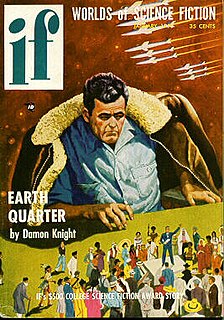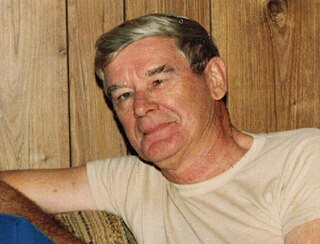Related Research Articles

Donald Allen Wollheim was an American science fiction editor, publisher, writer, and fan. As an author, he published under his own name as well as under pseudonyms, including David Grinnell.

A fandom is a subculture composed of fans characterized by a feeling of empathy and camaraderie with others who share a common interest. Fans typically are interested in even minor details of the objects of their fandom and spend a significant portion of their time and energy involved with their interest, often as a part of a social network with particular practices, differentiating fandom-affiliated people from those with only a casual interest.
The Futurians were a group of science fiction (SF) fans, many of whom became editors and writers as well. The Futurians were based in New York City and were a major force in the development of science fiction writing and science fiction fandom in the years 1937–1945.
The Science Fiction and Fantasy Writers of America, Inc., or SFWA is a nonprofit 501(c)(3) organization of professional science fiction and fantasy writers. While SFWA is based in the United States, its membership is open to writers worldwide. The organization was founded in 1965 by Damon Knight under the name Science Fiction Writers of America, Inc. The president of SFWA as of July 1, 2021 is Jeffe Kennedy.

Science fiction fandom or SF fandom is a community or fandom of people interested in science fiction in contact with one another based upon that interest. SF fandom has a life of its own, but not much in the way of formal organization.

Damon Francis Knight was an American science fiction author, editor and critic. He is the author of "To Serve Man", a 1950 short story adapted for The Twilight Zone. He was married to fellow writer Kate Wilhelm.

A science-fiction fanzine is an amateur or semi-professional magazine published by members of science-fiction fandom, from the 1930s to the present day. They were one of the earliest forms of fanzine, within one of which the term "fanzine" was coined, and at one time constituted the primary type of science-fictional fannish activity ("fanac").

Science fiction conventions are gatherings of fans of the speculative fiction genre, science fiction. Historically, science fiction conventions had focused primarily on literature, but the purview of many extends to such other avenues of expression as films, television, comics, animation, and games. The format can vary but will tend to have a few similar features such as a guest of honour, discussion panels, readings and large special events such as opening/closing ceremonies and some form of party or entertainment. Science fiction conventions started off primarily in the UK and US but have now spread further and several countries have their own individual conventions as well as playing host to rotating international conventions.
WisCon or Wiscon, a Wisconsin science fiction convention, is the oldest, and often called the world's leading, feminist science fiction convention and conference. It was first held in Madison, Wisconsin in February 1977, after a group of fans attending the 1976 34th World Science Fiction Convention in Kansas City was inspired to organize a convention like WorldCon but with feminism as the dominant theme. The convention is held annually in May, during the four-day weekend of Memorial Day. Sponsored by the Society for the Furtherance and Study of Fantasy and Science Fiction, or (SF)³, WisCon gathers together fans, writers, editors, publishers, scholars, and artists to discuss science fiction and fantasy, with emphasis on issues of feminism, gender, race, and class.

Arthur Wilson "Bob" Tucker was an American theater technician who became well known as a writer of mystery, action adventure, and science fiction under the name Wilson Tucker.
The New England Science Fiction Association, or NESFA, is a science fiction club centered in the New England area. It was founded in 1967, "by fans who wanted to do things in addition to socializing". NESFA is currently registered as a non-profit literary organization under IRS section 501(c)(3).
An amateur press association (APA) is a group of people who produce individual pages or zines that are sent to a Central Mailer for collation and distribution to all members of the group.

The Gaylactic Network is a North American LGBT science fiction fandom organization. It has several affiliate chapters across the United States and Canada, with a membership of LGBT people and friends, sharing an interest in science fiction, fantasy, horror, comics and role-playing games.
Advent:Publishers is an American publishing house. It was founded by Earl Kemp and other members of the University of Chicago Science Fiction Club, including Sidney Coleman, in 1955, to publish criticism, history, and bibliography of the science fiction field, beginning with Damon Knight's In Search of Wonder.
The Fantasy Amateur Press Association or FAPA ("FAP-uh") is science fiction fandom's longest-established amateur press association ("apa"). It was founded in 1937 by Donald A. Wollheim and John B. Michel. They were inspired to create FAPA by their memberships in some of the non-science fiction amateur press associations, which they learned about from H. P. Lovecraft.
Diversicon is an annual speculative fiction convention held the first weekend of August in the Minneapolis-Saint Paul, Minnesota area. Diversicon provides programming and social opportunities to encourage the multicultural, multimedia exploration and celebration of SF by those within and outside of the traditional SF community. Diversicon includes both live and posthumous guests. It is sponsored by SF Minnesota.
Speculative Fiction Group formerly known as Fantasy Academy is a Persian literature group whose main representation media is the website Fantasy Academy (www.fantasy.ir). Speculative Fiction Group (SFG) is composed of a group of writers, researchers, translators and fans of science-fiction, fantasy, horror fiction, and detective literary genres. The group is the governing body of the Persian Speculative Fiction Art and Literature Award, Shegetzar online magazine, Persian Speculative Encyclopedia, and Persian SF&F Fanzine.
The role of women in speculative fiction has changed a great deal since the early to mid-20th century. There are several aspects to women's roles, including their participation as authors of speculative fiction and their role in science fiction fandom. Regarding authorship, in 1948, 10–15% of science fiction writers were female. Women's role in speculative fiction has grown since then, and in 1999, women comprised 36% of the Science Fiction and Fantasy Writers of America's professional members. Frankenstein (1818) by Mary Shelley has been called the first science fiction novel, although women wrote utopian novels even before that, with Margaret Cavendish publishing the first in the seventeenth century. Early published fantasy was written by and for any gender. However, speculative fiction, with science fiction in particular, has traditionally been viewed as a male-oriented genre.
The Ditmar Award has been awarded annually since 1969 at the Australian National Science Fiction Convention to recognise achievement in Australian science fiction and science fiction fandom. The award is similar to the Hugo Award but on a national rather than international scale.
Philadelphia Science Fiction Society (PSFS) is a science fiction club in Philadelphia, Pennsylvania. Established in 1936, PSFS is the second oldest extant group in science fiction fandom, and hosted what is considered by some to be the first science fiction convention. Anyone living in the greater Philadelphia area and interested in science fiction, fantasy, horror, whether written or on TV or in the movies; SF, fantasy, and horror art; gaming, board games or video games; comic books/graphic novels; and related arts is welcome.
References
- ↑ Joshi, S.T. (November 4, 2010). Encyclopedia of the Vampire: The Living Dead in Myth, Legend, and Popular Culture . Greenwood. p. 103. ISBN 978-0313378331.
- ↑ "Heath Row Amateur Press Association Collection". University of Iowa. Retrieved April 17, 2013.
- ↑ Anthony, Piers (2001). How Precious was that While: An Autobiography. Macmillan. p. 187. ISBN 0812575431.
- ↑ "Bonfire V1, #4 - Page 7". Archived from the original on 2019-12-28.